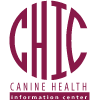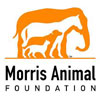Explanation of DM DNA Test Results
Normal (N/N)
This dog is homozygous N/N for the mutation that is the most common cause of DM, with two normal copies of the gene. Among the hundreds of dogs studied so far at the University of Missouri, only two dogs with test results of N/N (Normal) have been confirmed to have DM. The N/N (Normal) dog can only transmit the normal counterpart of the common mutation to its offspring, and it is unlikely that this dog or its offspring will ever develop DM.
Carrier (A/N)
This dog is heterozygous A/N, with one mutated copy of the gene and one normal copy of the gene, and is classified as a carrier. Carriers are far less likely to develop DM, but we have confirmed DM in a few carrier dogs. They may be used carefully in breeding programs to keep their good qualities while reducing risk of DM in future generations.
At-Risk (A/A)
This dog is homozygous A/A, with two mutated copies of the gene, and is at risk for developing Degenerative Myelopathy (DM). Although almost all dogs in the research study with confirmed DM have had A/A DNA test results, recent evidence suggest that there are other causes of DM in some breeds. In addition, not all dogs testing as A/A have shown clinical signs of DM. DM is typically a late onset disease, and dogs testing as A/A that are clinically normal may still begin to show signs of the disease as they age. Some dogs testing A/A did not begin to show clinical signs of DM until they were 15 years of age. Research is ongoing to estimate what percentage of dogs testing as A/A will develop DM within their lifespan. At this point, the mutation can only be interpreted as being at risk of developing DM within the animal's life. For dogs showing clinical signs with a presumptive diagnosis of DM, affected (A/A) test results can be used as an additional tool to aid in the diagnosis of DM. Dogs testing At-Risk (A/A) can only pass the mutated gene on to their offspring.
Equivocal
An Equivocal test result indicates that the test results were inconclusive. This is typically the result of poor sample collection. When the test yields an equivocal result, a second punch will be taken from the FTA card and the test rerun. If the second test is still equivocal, the owner will be contacted and asked to submit a new sample.




